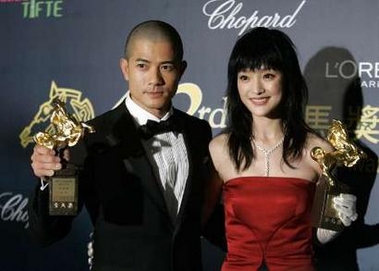HK pop idol, mainland actress prove mettle at Chinese Oscars
(AP)Updated: 2006-11-26 11:19
Hong Kong pop idol Aaron Kwok proved he's a bona fide actor and mainland China's Zhou Xun cemented her status as one of the industry's biggest stars as the duo won top acting honors at the 43rd Golden Horse Awards _ the Chinese-language equivalent of the Oscars.
No movie emerged the dominant winner in evenly split results announced in Taipei late Saturday.
Zhou's movie, the musical "Perhaps Love," also took home best director for Hong Kong's Peter Chan, but Kwok's film, "After This Our Exile," the meticulously told story of a troubled family's breakdown, won best picture and best supporting actor for 9-year-old Ian Gouw.
"Perhaps Love" also won for best cinematography and best original film song.
The 41-year-old Kwok made his name as one of Chinese pop's "Four Heavenly Kings" in the 1990s, along with Jacky Cheung, Andy Lau and Leon Lai.
Considered the best dancer of the quartet, he was never known for his singing _ let alone acting _ skills.
Kwok boosted his acting credentials with a surprise best actor win at last year's Golden Horse Awards for playing a troubled police officer obsessed with his missing wife in "Divergence."
He proved last year's win wasn't a fluke by clinching top acting honors again this year with a powerful performance of the downward spiral of a hot-tempered cook, who pimps and forces his son to steal after losing his job, his home and his wife.
Kwok described his growth as a performer.
"When you grow up, first you have to let go of your so-called baggage as an idol. Once you're free of the baggage of an idol, you can play any character in a relaxed state. You can have different creative spaces and you don't have any boundaries," he told reporters after his win.
Meanwhile, Chinese actress Zhou completed a clean sweep of Chinese cinema's top awards for her portrayal of a movie star caught between past and present loves in "Perhaps Love."
Zhou's character also won best actress honors at the Hong Kong Film Awards, Hong Kong's Golden Bauhinia awards and Hong Kong Film Critics Society awards earlier this year.
After her win, she said acting "like life, is a constant learning process."
"As I myself mature, my performance of characters will also mature," Zhou said.
The best picture win for "After This Our Exile" also marks a successful comeback for director Patrick Tam, considered part of Hong Kong's "new wave" of cinema in the 1980s.
The movie is Tam's first after a 17-year break, during which he trained screenwriters in Malaysia and edited famed Hong Kong art-house director Wong Kar-wai's "Days of Being Wild." The director didn't attend the awards ceremony.
Saturday's best director winner Peter Chan, who made "Comrades: Almost a Love Story" and the Hollywood movie "The Love Letter," also didn't show up. His girlfriend actress Sandra Ng accepted the award for him.
Chan's win makes up for a loss in the category at the Hong Kong Film Awards in April.
Much attention was focused on the tender-aged best supporting actor Gouw, who played the son of Kwok's character in "After This Our Exile." At age 9, the Dutch citizen is the youngest-ever winner in his category at the Golden Horse Awards.
Gouw, the son of an Indonesian-Chinese father and a Hong Kong actress, struggled through his acceptance speech and broke down in tears backstage, apparently overwhelmed by the throngs of reporters surrounding him.
The best supporting actress prize went to Nikki Shie for "Reflections," about a lesbian relationship that went sour.
Organizers gave the lifetime achievement award to a non-filmmaker _ Taiwanese movie poster artist Cheng Tzu-fu, who has some 5,000 posters to his credit.
Hollywood director and Hong Kong native John Woo presented the best film award with Taiwanese-Japanese actor Takeshi Kaneshiro, and singers Coco Lee and Karen Mok performed.
Chang Chen, who was in contention for best actor until his movie "The Go Master," was pulled from competition, instead became the presenter for the prize with Mok.
"The Go Master" was alleged withdrawn under pressure from China, which split with Taiwan amid civil war in 1949 but still wants to unify with the island.
Beijing is reportedly upset that two Taiwanese-only awards at the Golden Horses were renamed "formosa" awards. "Formosa," Portuguese for "beautiful island," is perceived by some to carry pro-independence connotations.
Malaysian-Chinese director Tsai Ming-liang also pulled his film, "I Don't Want to Sleep Alone," reportedly over criticism from the jury of his film making style, which is highly experimental, shunning music and dialogue.
A list of winners in the major categories of the 43rd Golden Horse
Awards, the Chinese-speaking world's version of the Oscars:
Best
film: "After This Our Exile"
Best director: Peter Chan ("Perhaps Love")
Best actor: Aaron Kwok ("After This Our Exile")
Best actress: Zhou Xun
("Perhaps Love")
Best supporting actor: Ian Gouw ("After This Our Exile")
Best supporting actress: Nikki Shie ("Reflections")
Best new performer:
Bryant Chang ("Eternal Summer")
|
||
|
||
|
|

